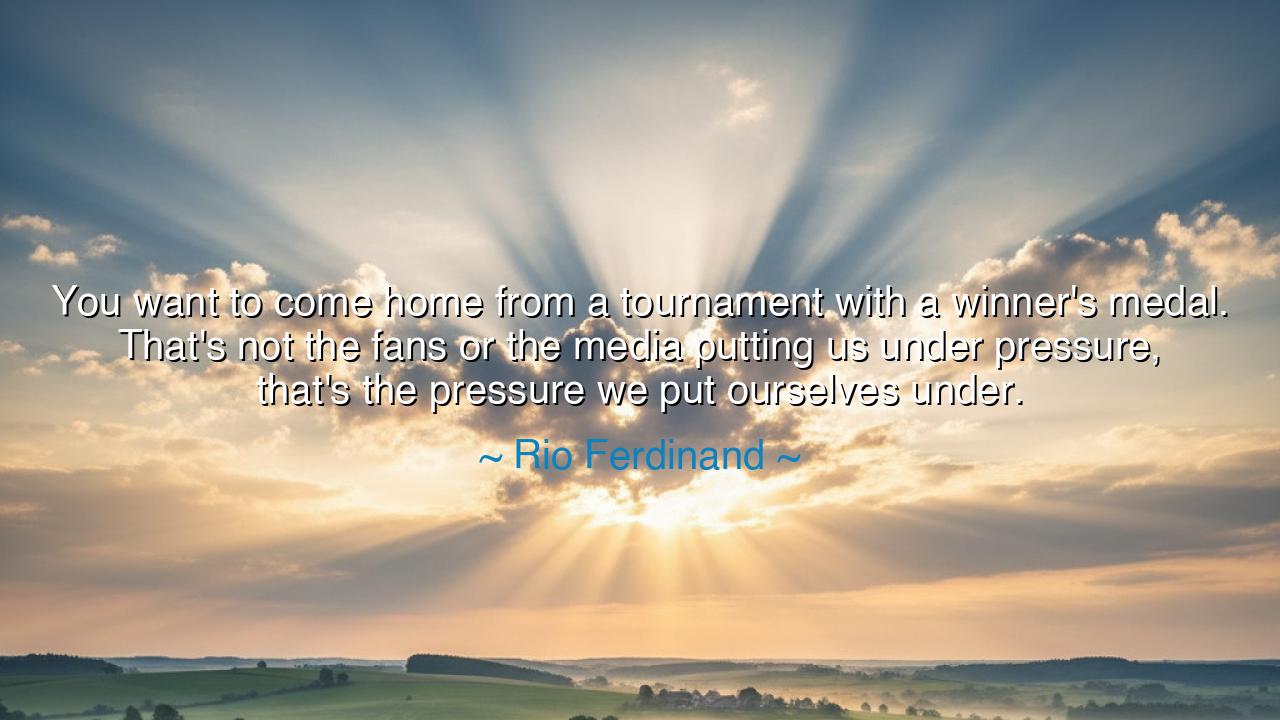
You want to come home from a tournament with a winner's medal.
You want to come home from a tournament with a winner's medal. That's not the fans or the media putting us under pressure, that's the pressure we put ourselves under.






“You want to come home from a tournament with a winner’s medal. That’s not the fans or the media putting us under pressure, that’s the pressure we put ourselves under.” Thus spoke Rio Ferdinand, a warrior of the modern arena, whose battles were fought not with sword and shield, but with heart, discipline, and the ceaseless weight of expectation. His words carry the solemn wisdom of those who have stood at the edge of victory and felt both its glory and its burden. For what he speaks of is no mere contest—it is the timeless human struggle between ambition and endurance, between the world’s demands and the inner fire that drives the soul to conquer.
In his statement, Ferdinand reveals a truth that echoes through the ages: that the greatest pressure does not come from the voices of others, but from the voice within. The applause of the crowd may fade, and the criticisms of the media may pass like wind—but the striving heart knows no rest. It whispers, you can be more, you can reach higher, you can become great. This is the sacred burden of those who seek excellence—to set standards so high that even triumph feels temporary, and to bear the constant weight of self-expectation. Such pressure is not a curse; it is the forge in which greatness is made.
The ancients, too, knew this struggle. The Spartans trained from childhood to master not their enemies, but themselves. When they marched into battle, they did not fear the taunts of rivals or the judgment of allies; they feared only falling short of their own code of honor. So too does Ferdinand speak from that same lineage of warriors—the athlete who seeks not praise, but perfection. For when one strives to “come home with a winner’s medal,” it is not merely for glory’s sake, but to fulfill the sacred covenant between self and potential.
And yet, how many crumble beneath the very weight of their own dreams? The poet Virgil, in telling the story of Aeneas, described the hero’s journey not as a tale of conquest, but of endurance. Aeneas bore the pressure of destiny itself, not from the cries of his people, but from the call of purpose within him. Like Ferdinand and his teammates, Aeneas carried the invisible burden of legacy—the knowledge that to fail was not to disappoint others, but to betray the greatness seeded in his own soul.
In the modern age, we often mistake external pressure for the true test of strength. We imagine that critics, fans, and onlookers are the source of our strain. But Ferdinand’s words cut through illusion. He reminds us that true mastery lies not in resisting others’ expectations, but in meeting one’s own. The artist, the scholar, the craftsman—all who strive for excellence must face this same inner fire. It is the fire of self-demand, of refusing mediocrity, of living each day in pursuit of a higher standard.
This truth carries both peril and power. For self-imposed pressure can destroy as easily as it can elevate. The one who chases perfection without compassion may lose peace; but the one who balances ambition with understanding becomes unstoppable. The wise know that the goal of life is not merely to win medals, but to become worthy of them—to refine the spirit through dedication, patience, and humility. To carry pressure with dignity is to transform it into strength, to make of it a teacher rather than a tormentor.
So let this be the lesson, O seeker of greatness: do not fear the weight you place upon yourself. Let it shape you, but not consume you. Strive with intensity, but rest with grace. Remember that the loudest critics are not outside of you, but within—and it is by mastering that inner voice that you achieve victory. When you labor toward your goal, do it not for applause, but for the quiet joy of knowing you gave everything you had. That is the true meaning of coming home with a winner’s medal—not merely in your hands, but in your heart.
For in the end, as Rio Ferdinand teaches, greatness is not measured by the world’s cheers, but by the standard we hold within ourselves. The world may forget the match, the crowd may move on—but the soul that has conquered its own doubt carries a glory that never fades.






AAdministratorAdministrator
Welcome, honored guests. Please leave a comment, we will respond soon